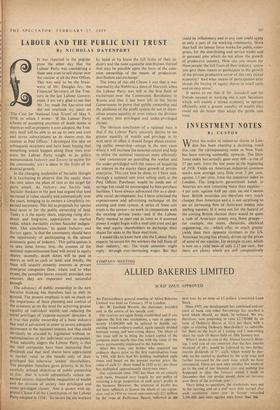LABOUR AND THE PUBLIC UNIT TRUST
By NICHOLAS DAVENPORT
• something would happen along these lines ever since the Labour Party sought in its policy memorandum Industry and Society to secure 'for the community' (sic) a. share in the fruits of in- dustrial growth. .
In the changing tendencies of Socialist thought it is fascinating to observe that the equity share has now taken the place of rent as the target for party ' attack. As Industry and Society said, Socialist thinkers in, the past had argued that land increased in value steadily and automatically over the years, bringing to its owners a Completely un- earned increment. This led to proposals for special land taxes or for the public ownership of land. Today it is the equity share, enjoying rising divi- dends and long-term appreciation in market, value, which inevitably excites Socialist' indigna- tion, 'Our conclusion,' to quote Industry and Society again, 'is that the community should have the opportunity of participating in the almost automatic gains of industry.' This pahicipation is to take . three forms; first, the trustees of the national superannuation fund will invest in equity shares; secondly, death ditties will be paid in shares as well as cash or land; and thirdly, the State will acquire minority interests in private enterprise companies (how, where and to what extent, the pamphlet leaves unsaid), provided, one assumes, they are important and successful enough.
The advocacy of public ownership in the new Socialist thinking has therefore had to shift its ground. The present emphasis is not so much on the importance of State planning and control of the economy as on the need for achieving greater equality of individual wealth and reducing the social privileges of 'expense-account' directors. It is true that public ownership of a basic industry like steel is advocated in order to secure adequate investment in the national interest, but that could obviously be attained by legislation without re- nationalisation of the individual steel companies. What naturally angers the Labour Party is that the steel companies have been increasing their dividends and that steel shares have appreciated in market value to the benefit only of their privileged but otherwise 'useless' shareholders. The pamphlet therefore gives priority in its five carefully defined objectives of public ownership to this: that it would substantially reduce un- earned income, unjustifiable inequalities of wealth and the division of society into privileged and under-privileged classes.' And it quotes with ap- provalClause 4 of the Constitution of the Labour Party adopted in 1918: 'To secure for the workers by hand or by brain the full fruits of their in- dustry and the most equitable distribution thereof that may be possible upon the basis of the com- mon ownership of the means of production. distribution and exchange.'
The irony of this old Clause 4 was that it was inserted by the Webbs as a piece of Marxism when the Labour Party was still in the first flush of excitement over the Communist Revolution in Russia and that it has been left to the Soviet Government to prove that public ownership and the abolition of the profit system do not in them- selves ensure equality or even reduce the division of society into privileged and under-privileged classes.
The obvious conclusion of a rational man is that if the Labour Party sincerely desires to see greater equality of wealth and privilege in its next term of, office it should forget about extend- ing public ownership—except in the rare cases where it will increase the national output and help to utilise the national resources more efficiently —and concentrate on providing the worker and the under-privileged with the means of acquiring an interest in the equity share growth of private enterprise. This can best be done, as I have said, through a national unit trust selling units at the Post Offices. Purchases would be made out of savings but could be encouraged by hire-purchase facilities. 1 have always advocated this as a desir- able social development, but I have criticised the expensiveness and advertising technique of the existing unit trust system. A series of State unit trusts is the answer—to work in.competition with the existing private trusts—and if the Labour Party wanted to. start one as soon as it assumed power it might 'begin with a steel unit trust and get the steel equity shareholders to exchange their shares for units in the State steel trust.
I would like to know how else the Labour Party expects 'to secure for the workers the full fruits of their industry,' etc. The trade unionists might reply: through ever-increasing wages. But that could be inflationary and in any case could apply to only a part of the working community. More than half the labour force works for public enter- prises, for the distributing and service trades and in personal jobs which do not allow the growth of productive industry. How can you secure for these. people 'the full fruits of their industry' unless you give them means to participate in the growth of the private productive sector of this very mixed economy? And what means of participation exist except the buying of equity shares in small units and on easy terms?
It seems to me that if Mr. Gaitskell and his friends succeed in working out a new Socialism which will enable a mixed economy to operate efficiently with a greater equality of wealth they could not do better than adopt the public unit trust.


































 Previous page
Previous page